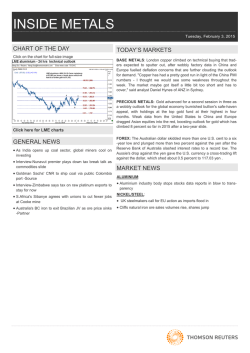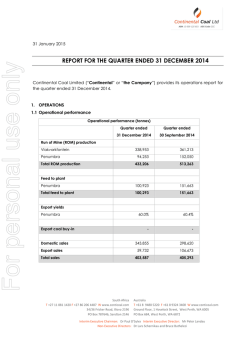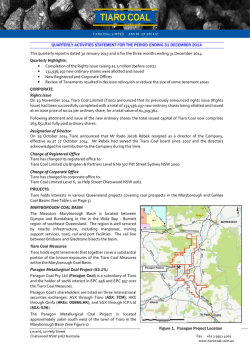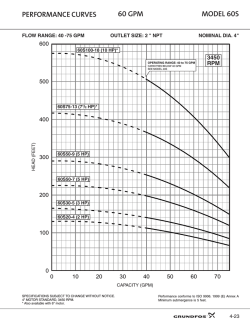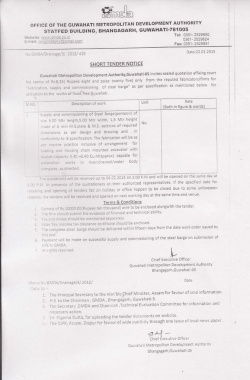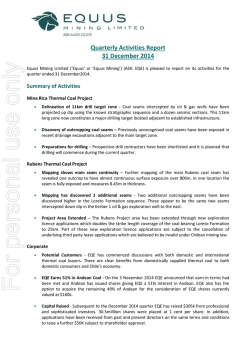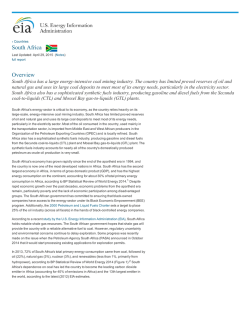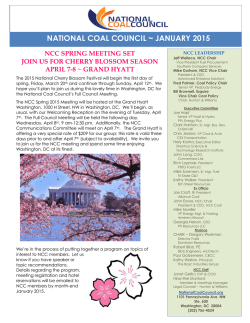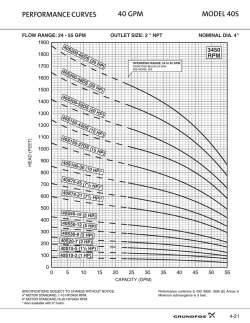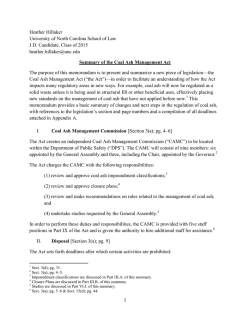
here - Thomson Reuters
INSIDE DRY FREIGHT Monday, February 2, 2015 Index (Total Return) Baltic Exch Dry Baltic Capesize Baltic Panamax Cash Prices Close 608 679 508 Change 0 0 0 Pct. Change 0.0% 0.0% 0.0% Port Congestion (Source: Global Ports) Port Hedland Ore Avg. Day Weekly Change 5 1 Newcastle Dyke Coal 12.5 8 Newcastle Kooragang Coal 9.5 8 1 2 2 0 0 Brazil Tubarao China Qingdao McCloskey AP14 60.6 0 0.0% India Paradip Ore 5.5 McCloskey AP12 58.88 0 0.0% India Paradip Coal 14.5 0 59.1 0 0.0% Rich. Bay Coal 1.5 -2 Coal Newcastle MARKET NEWS TODAY’S MARKETS FREIGHT Baltic sea freight index explores new lows since 1986 FREIGHT: The Baltic Exchange's main sea freight index, which tracks rates for ships carrying dry bulk commodities, continued its slide, again hitting the lowest in nearly three decades on Friday as rates for all the four vessel segments fell. The overall index, which factors in average daily earnings of capesize, panamax, supramax and handysize dry bulk transport vessels, was down 24 points, or 3.8 percent, at 608 points, the lowest since August 1986. COAL China coal set to post its biggest profit fall in a decade in 2014 Breakingviews- Modi market mania faces test in $3.7 bln coal sale Polish coal miner JSW writes down value of one of its mines Consol hires advisers to evaluate thermal coal MLP IRON ORE China steel futures end 3 days of gains, poor factory data drags India's JSW steel calls for action against Chinese steel "dumping" ArcelorMittal says may curb Poland production if no end to miner strike STEEL: China's steel futures dropped on Monday, ending three sessions of gains after surveys showed the country's manufacturing activity shrank for the first time in over two years. Slowing steel demand during winter in the world's largest producer also dragged on prices. "As enduser purchasing activity remains thin, steel traders are still holding back restocking and some are expecting prices to fall further, so it is not certain that prices have already bottomed out," said Du Hui, an analyst with Qilu Securities in Shanghai. GLOBAL MARKETS: Asian shares languished, after the latest gauge of China's factory sector activity raised concerns about the world's second-largest economy. Financial spreadbetters expected European bourses to follow suit, with Britain's FTSE 100 seen opening flat to 6 points lower, or down as much as 0.1 percent; Germany's DAX seen opening 27 to 36 points lower, or down as much as 0.3 percent; and France's CAC 40 expected to open 1 to 4 points lower, or down as much as 0.1 percent. INSIDE DRY FREIGHT February 2, 2015 MARKET NEWS China's coal production is estimated to have fallen 2.5 percent in 2014, the first annual drop in more than a decade due to the fight against pollution and government efforts to tackle a supply glut as demand from industry and the power sector weakens. Baltic sea freight index explores new lows since 1986 The Baltic Exchange's main sea freight index, which tracks rates for ships carrying dry bulk commodities, continued its slide, again hitting the lowest in nearly three decades on Friday as rates for all the four vessel segments fell. The China Coal Industry Association also estimated that profits of coal mines fell 44 pct in first 11 months of last year, and that 70 percent of them made losses over the period. The overall index, which factors in average daily earnings of capesize, panamax, supramax and handysize dry bulk transport vessels, was down 24 points, or 3.8 percent, at 608 points, the lowest since August 1986. Breakingviews- Modi market mania faces test in $3.7 bln coal sale The capesize index shed 46 points, or about 6.34 percent, to 679 points. A lumbering, state-controlled monopoly is about to test the Indian stock market's 'Modi Mania'. The government is selling a stake in Coal India worth around $3.7 billion to meet its fiscal deficit target. A pledge to ramp up domestic coal production makes it easier to lure investors. Still, the placing will set the tone for a stock market that has rallied by one quarter following the election of Prime Minister Narendra Modi last year. Average daily earnings for capesize vessels, which typically transport 150,000-tonne cargoes such as iron ore and coal, declined $285 to $6,707. The panamax index was down 42 points or 7.64 percent at 508 points. Average daily earnings for panamaxes, which usually carry coal or grain cargoes of about 60,000 to 70,000 tonnes, slid $332 to $4,060. Both are at its lowest levels in seven months. The sale of up to 10 percent of Coal India at a maximum 4.5 percent discount to the closing price on Jan. 29 is a big deal to swallow. Assuming the government sells the entire stake, it will be the country's largest capital market transaction ever. The proceeds will be equivalent to more than a third of the entire amount raised through initial public offerings, follow-on issues, and convertible bonds in India last year, according to Thomson One. The supramax index was down 14 points at 585 points, while the handysize index slipped 8 points to 340 points. China coal set to post its biggest profit fall in a decade in 2014 In spite of its inefficiencies, Coal India has some attractive qualities. Low-cost mines allow it to easily cover its capital expenditure and pay chunky dividends even though the company is obliged to sell the bulk of its production below global prices, which are currently near multi-year lows. That's likely to be the case even if the sector is opened up to more competition. China Coal, the country's second-largest coal producer, expects its net profit to fall by as much as 85 percent, which would be its biggest earnings drop in 10 years as the sector is hit by persistent oversupply exacerbated by a slowing Chinese economy. China Coal Energy Co Ltd's 2014 net profit is expected to drop 75-85 percent as a continued downturn of the sector pushes prices lower, it said in a statement to the Hong Kong stock exchange on Friday. Modi's promise to provide round-the-clock energy to the entire population is also already having a positive effect. Coal India's production grew 7.3 percent in the nine months to the December, compared with a 1.6 percent annual average growth rate for the past five years, according to Ambit. In 2013, the coal producer posted a net profit of 3.58 billion yuan ($572.85 million). The fall marks the steepest since 2005, according to Thomson Reuters data. The company first went public in Hong Kong in 2006 and has issued profit growth figures dated back to 2005. A successful sale that attracts a broad range of domestic and international private-sector investors will give a confidence boost to the many deals in-waiting. The government is expected to offer shares in Oil and Natural Gas Corporation and power producer NHPC worth a further $3 billion before the end of March. Elsewhere, State Bank of India is seeking to raise around $2.4 billion and Tata Motors wants to raise $1.2 billion. An uptick in initial public offerings is also expected. Coal India will test the market's willingness to absorb the unusually large pipeline. China Coal's profit warning follows a slew of smaller rivals expecting sharp earnings falls in 2014, they said this week. Zhengzhou Coal Mining Machinery Group Co Ltd, Henan Dayou Energy Co Ltd, Shaanxi Coal Industry Co Ltd and Shanxi Xishan Coal and Electricity Power all expect profit for 2014 to fall by at least 70 percent. Shanxi Coal International Energy Group Co Ltd, Taiyuan Coal Gasification Co Ltd and Henan Shenhuo Coal & Power Co Ltd expect to swing into the red, blaming weak prices due to the supply glut. Polish coal miner JSW writes down value of one of its mines "The trend of coal oversupply and falling prices has not changed due to easing economic growth," Henan Dayou said in a Chinese-language filing to the Shanghai stock exchange. Polish coal miner JSW said on Friday it has decided to write down the value of one of its coal mines by 224 million zlotys ($60.40 million) due to the fall in coal prices. Spot coal prices from Qinhuangdao port have dropped further to 518 yuan a tonne, after falling by about 15 percent in 2014. The miner said the write-down on its Krupinski coal mine, which 2 INSIDE DRY FREIGHT February 2, 2015 MARKET NEWS (Continued) may still be subject to change, will affect the group's 2014 financial result due March 19. The most-traded May rebar contract on the Shanghai Futures Exchange closed down 0.3 percent at 2,492 yuan ($398). The futures price has already fallen 3.7 percent so far this year. Trade unions at JSW, which is controlled by the Polish treasury, went on strike on Wednesday against the company's plans to cut costs. A government survey showed China's factory sector unexpectedly shrank for the first time in nearly 2-1/2 years in January, and firms saw more gloom ahead. "We don't see any good signs for demand recovery this month, so steel prices are likely to stay at currently low levels," said Xu Huimin, an analyst with Huatai Great Wall Futures in Shanghai. Consol hires advisers to evaluate thermal coal MLP Consol Energy Inc said it hired advisers to evaluate a master limited partnership structure for its thermal coal business, as it shifts focus to boosting natural gas production. A slowing economy and stagnant demand growth for commodities have already piled stress on Chinese steel mills, with some reporting losses for last year. The company said it expected to invest $1 billion in its oil and natural gas business in 2015, compared with the $220 million in its coal business. Shandong Iron & Steel Co Ltd said it expected a net loss in 2014 of about 1.35 billion yuan ($215.68 million) versus a net profit of 158.3 million yuan the year before. Consol said production in its natural gas business would likely grow by 30 percent this year. Weaker steel prices have forced Chinese steel mills to scale back production, curbing appetite for iron ore with spot prices slumping to their lowest since May 2009. The company also said an initial public offering of its metallurgical, or steel-making, coal business is likely in the fourth quarter. Benchmark 62 percent grade iron ore for immediate delivery to China fell 1 percent to $61.70 a tonne on Friday, posting its biggest monthly fall since May 2013, according to data compiled by the Steel Index. Coal miners have been weighed down by a switch by U.S. utilities to cheaper natural gas from power-generating coal, and weaker demand from top consumer China for steel-making coal. Consol's coal business accounts for more than half of its total revenue. Iron ore futures for May delivery on the Dalian Commodity Exchange closed down 0.4 percent at 472 yuan. Master Limited Partnership (MLPs) have become increasingly popular as they pay no taxes at the federal level and distribute most of their cash flows as dividends to investors. India's JSW steel calls for action against Chinese steel "dumping" Revenue rose 13 percent to $935.7 million in the fourth quarter ended Dec. 31, boosted by sales of oil, natural gas, and natural gas liquids. India's JSW Steel Ltd on Friday urged the government to address "dumping" of cheap steel by Chinese rivals and take steps to improve iron ore availability after lower steel prices led to a 30 percent drop in the company's third-quarter profit. Net income from continuing operations halved to $73.7 million, or 32 cents per share. Exploration and production costs rose nearly 24 percent to $294.3 million. Steel imports into India leapt by more than 60 percent in the April to December period, with 1 million tonnes imported in December alone, group Chief Financial Officer Seshagiri Rao told reporters in Mumbai. Consol reported an adjusted profit of 25 cents, 5 cents above the average analyst estimate, according to Thomson Reuters I/ B/E/S. "We have been representing to the government that they should take steps, as is being done by various countries, in stopping the dumping and to stop injury to the domestic industry," Rao said. Analysts had expected revenue of $956.1 million. Up to Thursday's close, Consol's shares had fallen 22 percent in the last 12 months, compared to a nearly 40 percent drop in the broader Dow Jones U.S. Coal index The company has been struggling with restricted supply of steel making raw materials, especially iron ore, due to mining bans in India and high domestic prices, forcing it to resort to imports to keep up production rates. China steel futures end 3 days of gains, poor factory data drags "The major concern going forward is the iron ore availability and iron ore pricing which is against the interest of domestic steel production," Rao said, pointing to a 14 percent rise in iron ore prices in India over the past year. International prices have halved in that time. China's steel futures dropped on Monday, ending three sessions of gains after surveys showed the country's manufacturing activity shrank for the first time in over two years. Slowing steel demand during winter in the world's largest producer also dragged on prices. JSW Steel, which needs about 25 million tonnes of the steel making raw material per year, said it imported over 40 percent of its requirement in the December quarter. "As end-user purchasing activity remains thin, steel traders are still holding back restocking and some are expecting prices to fall further, so it is not certain that prices have already bottomed out," said Du Hui, an analyst with Qilu Securities in Shanghai. It posted a consolidated net profit of 3.29 billion rupees ($53.07 million) for the quarter ended Dec. 31, its fiscal third. 3 INSIDE DRY FREIGHT February 2, 2015 MARKET NEWS (Continued) "We are changing the product mix so that we are not competing in the commodity space with the Chinese. We are making that extra effort to see that more and more value added products get exported." Jayant Acharya, Director - Commercial and Marketing at JSW Steel, said. long term we can cope, but as we have a few days' worth of resources, in the coming days we may have to curb production." "We're trying to look for alternative supply sources. A ship with overseas coal is on its way," she added. The spokeswoman declined to comment on whether ArcelorMittal, the world's largest steel maker, plans to seek compensation from JSW or if alternative supplies are more costly. ArcelorMittal says may curb Poland production if no end to miner strike Trade unions at JSW, which is controlled by the Polish treasury, went on strike on Wednesday against the company's plans to cut costs. Steel producer ArcelorMittal's Polish unit said on Friday it might have to curb production if JSW, its main coking coal supplier, does not in the next few days resume deliveries that have been halted by a miners' strike. ArcelorMittal's Polish coking plant in Zdzieszowice is the largest of its kind in Europe. The company's steel plants account for 70 percent of Poland's steel production capacity. ArcelorMittal Polska spokeswoman Sylwia Winiarek said the steel maker did not receive supplies from JSW, the European Union's largest coking coal miner, for the third day running on Friday. "The situation is tough, as JSW's provides up to 60 percent of the coal we use," Winiarek told Reuters. "In the medium and For more information: Learn more about our products and services for commodities professionals, click here Send us a sales enquiry, click here Contact your local Thomson Reuters office, click here (Inside Dry Freight is compiled by Atiqul Habib in Bangalore) For questions and comments on Inside Dry Freight click here Your subscription: If you would like to subscribe to Thomson Reuters commodities newsletter please click here © 2015 Thomson Reuters. All rights reserved. This content is the intellectual property of Thomson Reuters and its affiliates. Any copying, distribution or redistribution of this content is expressly prohibited without the prior written consent of Thomson Reuters. Thomson Reuters shall not be liable for any errors or delays in content, or for any actions taken in reliance thereon. Thomson Reuters and its logo are registered trademarks or trademarks of the Thomson Reuters group of companies around the world. Privacy statement: To find out more about how we may collect, use and share your personal information please read our privacy statement here To unsubscribe to this newsletter click here 4
© Copyright 2026

